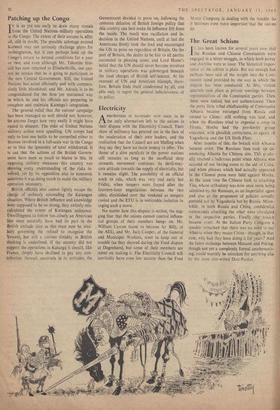Patching up the Congo
TT is as yet too early to draw many morals 'from the United Nations military operations in the Congo. The extent of their success is, after all, still in doubt. The possible sabotage around Kolwezi may not seriously challenge plans for re-integration, but it can perhaps hold up the Congo's return to normal conditions for a year or two; and even although Mr. Tshornbe him- self has now returned to Elisabethville, one can- not be certain that he is going to participate in the new Central Government. Still, the United Nations has acted efficiently and with compara- tively little bloodshed; and Mr. Adoula is to be congratulated for the firm 'yet restrained way in which he and his officials are preparing to complete and maintain Katanga's integration.
The general relief that the current campaign has been managed so well should not, however, let anyone forget how very easily it might have 'ended in disaster. The risks of United Nations military- action were appalling. UN troops had only to lose one battle to be compelled either to become involved in a full-scale war in the Congo or to face the ignominy of total withdrawal. It is sad that the actions of the British Govern- ment have been so much to blame in this. In opposing military measures this country was showing every understanding of the risks in- volved, yet by its opposition also to economic sanctions it was doing much to make the military operation necessary.
British officials also cannot lightly escape the charge of seriously misreading the Katangan situation. Where British influence and knowledge *ere supposed to be so strong, they entirely mis- calculated the extent of Katangan resistance. Unwillingness to follow too closely an American line must naturally have had its part in the British attitude (just as this must now be simi- larly governing the refusal to recognise the Yemen), but still a curious timidity in British thinking is underlined. If the country did not support the operations in Katanga it should, like France, simply have declined to pay any con- tribution. Instead, uncertain in its attitudes, the Government decided to press on, following the common delusion of British foreign policy that this country can best make its influence felt from the inside. The result was vacillation and in- decision in the United Nations, until at last the Americans firmly took the lead and encouraged the UN to press on regardless of Britain. On the part of Britain, the desire to be fair to all parties succeeded in pleasing none; and Lord Home's belief that the UN should never become involved in military operations was ubmerged beneath the loud charges of British self-interest. At the moment of UN and American triumph, there- fore, Britain finds itself condemned by all, and able only to regret the general indecisiveness of its policy.






























 Previous page
Previous page